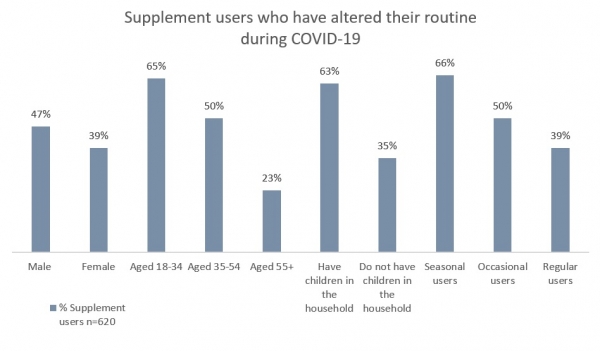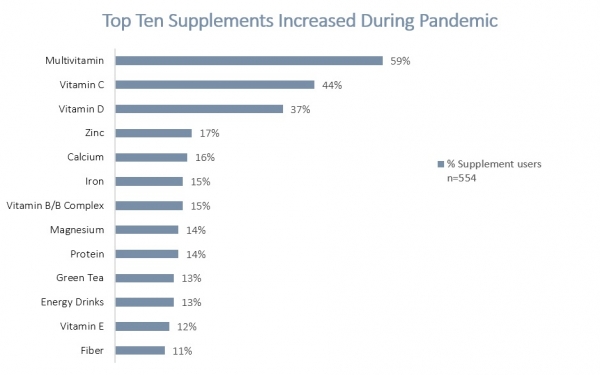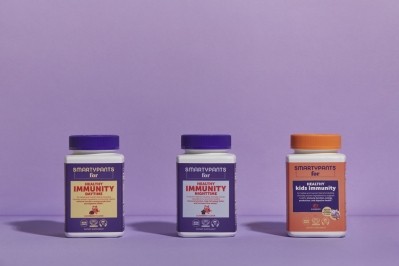Dietary supplement usage changes & increases during pandemic, says new Ipsos-CRN survey

The survey, which included a national sample of 2,004 adults aged 18 and older living in the United States*, found that the top two reasons supplement users increased their supplement routine was for ‘overall immune support’ (57%) and for health/wellness benefits (53%).
At least one third of supplement users who changed their supplement regimen also cite reducing the risk of serious illness (42%) and taking greater control over their health (34%) as top reasons for increasing their supplement routine throughout the health crisis.
“CRN and Ipsos’ recent survey demonstrates that in light of the pandemic, most supplement users believe it is important that they continue incorporating dietary supplements into their lifestyle (88%), with many supplement users actually increasing their intake of dietary supplements,” said Chris Jackson, senior vice president, public affairs, Ipsos.
“The data not only show increases in supplement intake throughout the pandemic, but point to sustained usage in the future as nearly all supplement users who changed their regimen (98%) indicate that they are likely to continue with their current dietary supplement routine moving forward.
“This data point, paired with supplement users’ sustained engagement in healthy lifestyle habits, suggests lasting changes as consumers continue to confront this public health crisis.”
Data
According to the survey, of the 43% of dietary supplement users to have changed their supplement routines since the start of the pandemic, 91% of these reported increasing their supplement intake which includes adding new supplements to their existing routines (46%); taking the same supplements more regularly (25%); or increasing dose(s) (22%).
The biggest boosts in supplement intake during COVID-19 were found for multivitamins (59%), vitamin C (44%) and vitamin D (37%).
Nine percent of supplement users who have changed their supplement regimen since the pandemic began also report increasing their intake of elderberry, with a 13% increase from female supplement users and 11% increase from supplement users aged 55+.
Eighty-five percent of Americans said that the pandemic is a reminder to take care of their overall health. Supplement users and non-users both reported practicing other healthy lifestyle habits throughout the crisis, but supplement users were found to be significantly more likely to engage in these healthy habits compared to non-users especially in the categories of staying hydrated, eating healthy, exercising regularly and managing stress.
“As consumers continue to confront the devastating public health effects of COVID-19, Americans are focused communications more than ever on their overall health and well-being,” said Brian Wommack, senior vice president, communications for the Council for Responsible Nutrition (CRN).
“As evidenced in the survey, dietary supplements continue to play a critical role in the lives of most Americans, and even more so in light of the ongoing health crisis. More than three quarters of Americans report taking dietary supplements and the overwhelming majority of supplement users, 83%, believe these products play an important role in helping to support health and wellness during COVID-19.”
Supporting health & wellness, not preventing coronavirus
In a press release, CRN stressed that while dietary supplements do play a critical role in supporting overall health and wellness, it is important to remember that no supplement may claim to treat, cure or prevent coronavirus or any other disease.
“Any product labeled as a dietary supplement that makes such claims is illegal and should be avoided,” stated the association, before citing recent legal actions by FDA and FTC targeting these products that underscore that consumers must be vigilant against fraudulent claims.
The COVID-19 survey found that nearly two in five (38%) Americans report that they have heard or read that there are dietary supplements that can possibly prevent or treat COVID-19.
“CRN would like to remind the dietary supplement industry and consumers that supplements may not claim to prevent, treat, or cure COVID-19,” said Luke Huber, ND, MBA, vice president, scientific & regulatory affairs, CRN. “CRN believes supplementation is an important component in maintaining a healthy lifestyle which also includes a proper diet, regular exercise, and adequate sleep.”
* The survey was conducted online in English and included 1,488 supplement users and 620 supplement users who changed their supplement regimen during the pandemic. The precision of Ipsos polls are measured using a credibility interval. In this case, the poll has a credibility interval of plus or minus 2.5 percentage points for all respondents, 2.9 percentage points for supplement users, and 4.5 percentage points for users who recently changed their supplement regimen.


















